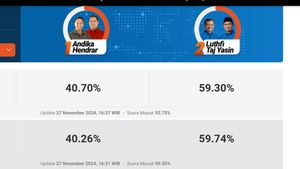JAKARTA - Indonesian Center of Reform on Economics (CORE) Economics (CORE) researcher Yusuf R Manilet said that the adjustment of Value Added Tax (VAT) rates needs to pay attention to the inflation trend.
This is because one of the effects that can then arise from the increase in VAT rates is inflation. "Therefore, the momentum for implementing this new VAT rate needs to pay attention to the trend of inflation and also the trend of people's purchasing power in general," Yusuf said, quoted from Antara, in Jakarta, Friday, March 22.
Furthermore, he said that actually the basis for the increase in VAT rates refers to the Law on Harmonization of Tax Regulations which has been ratified since 2021. VAT tariff adjustments are made to increase tax revenue.
"Why did the government then adjust tax rates because the government was chasing to increase the tax ratio to gross domestic products in the long term," he said. On the other hand, Yusuf said that the government could actually take the option to implement a progressive VAT policy, which means that VAT will not be single tariffs but multi tariffs and will be adjusted to the goods that will be consumed by the group. people's income.
Previously, Coordinating Minister for Economic Affairs Airlangga Hartarto said the Value Added Tax (VAT) rate rose to 12 percent in 2025.Airlangga said the rules for increasing VAT rates would be discussed further and implemented by the next government.
SEE ALSO:
The increase in VAT to 12 percent is one of the government's tax adjustments plans regulated in Law Number 7 of 2021 concerning Harmonization of Tax Regulations (UU HPP).
The English, Chinese, Japanese, Arabic, and French versions are automatically generated by the AI. So there may still be inaccuracies in translating, please always see Indonesian as our main language. (system supported by DigitalSiber.id)
















